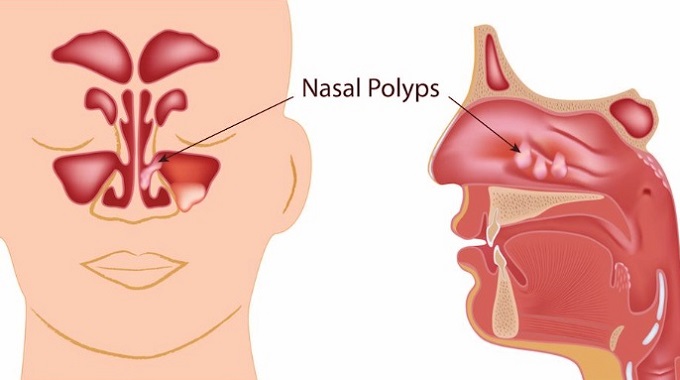Nikhil Prasad Fact checked by:Thailand Medical News Team Aug 04, 2025 6 months, 2 weeks, 6 days, 28 minutes ago
Medical News: A team of doctors from Ecuador and Germany have published a rare medical case linking COVID-19 to the unexpected development of nasal polyps—a condition involving noncancerous growths inside the nose that can obstruct breathing and disrupt quality of life.
 COVID-19 Triggers Development of Nasal Polyps
COVID-19 Triggers Development of Nasal Polyps
Researchers from the Respiralab Research Group and Universidad Espíritu Santo in Ecuador, along with collaborators from Hospital Clínica Kennedy Alborada, Hospital Luis Vernaza, and Charité - Universitätsmedizin Berlin in Germany, documented the case of a 61-year-old man who developed nasal polyposis several months after recovering from COVID-19. The man, who had no history of allergies or sinus issues, began suffering from persistent nasal congestion, sneezing, dry cough, fatigue, and sleep disturbances after his infection.
This
Medical News report highlights how rhinoscopy and CT scans confirmed the presence of inflamed nasal tissue and polypoid cysts. Doctors diagnosed the patient with pansinusitis and nasal polyposis, an uncommon aftermath of COVID-19. He was prescribed mometasone furoate nasal spray, a corticosteroid, along with saline nasal washes. His symptoms improved dramatically over a few months, with reduced polyp size and better nasal airflow.
A Rare but Concerning Complication of Long COVID
The study sheds light on how the immune system might play a role in this condition. Researchers believe that COVID-19 may trigger abnormal inflammation in the nasal passages, possibly through a mechanism involving Toll-like receptors (TLRs). These immune sensors respond to viral invaders by releasing inflammatory substances like cytokines, which in excess can damage tissue and potentially lead to polyp formation.
The patient’s improvement was tracked using patient-reported outcome measures (PROMs) like the SNOT-22 and RSDI scoring systems. His SNOT-22 score dropped from 42 to just 5 points over four months—a dramatic reduction in symptom severity. This finding demonstrates how even simple nasal sprays can help when inflammation is caught early and properly managed.
Interestingly, the patient also experienced other signs of Long COVID such as insomnia, brain fog, and lingering fatigue, further supporting the idea that nasal polyps could be part of a broader spectrum of post-COVID inflammatory disorders.
Why This Matters
This case is one of the first to suggest that nasal polyps could be part of the Long COVID syndrome. It emphasizes the importance of early diagnosis and treatment of post-COVID nasal and sinus symptoms. Nasal polyposis may not be just a standalone ENT issue—it could signal deeper immune dysfunction caused by the virus.
More research is needed, but doctors are urged to look out for nasal issues in their Long COVID patients. With the right care, complications like these can be managed, improving patient outcomes and quality of life.
The study findings were publishe
d in the peer reviewed journal: Otolaryngology Case Reports
https://www.sciencedirect.com/science/article/pii/S2468548825000311
For the latest COVID-19 news, keep on logging to Thailand
Medical News
Read Also:
https://www.thailandmedical.news/news/covid-19-induces-epigenetic-changes-in-nasal-cells,-resulting-in-long-term-breathing-issues
https://www.thailandmedical.news/news/hpv-linked-benign-nasal-tumors
https://www.thailandmedical.news/news/microbes-may-fuel-nasal-tumors
